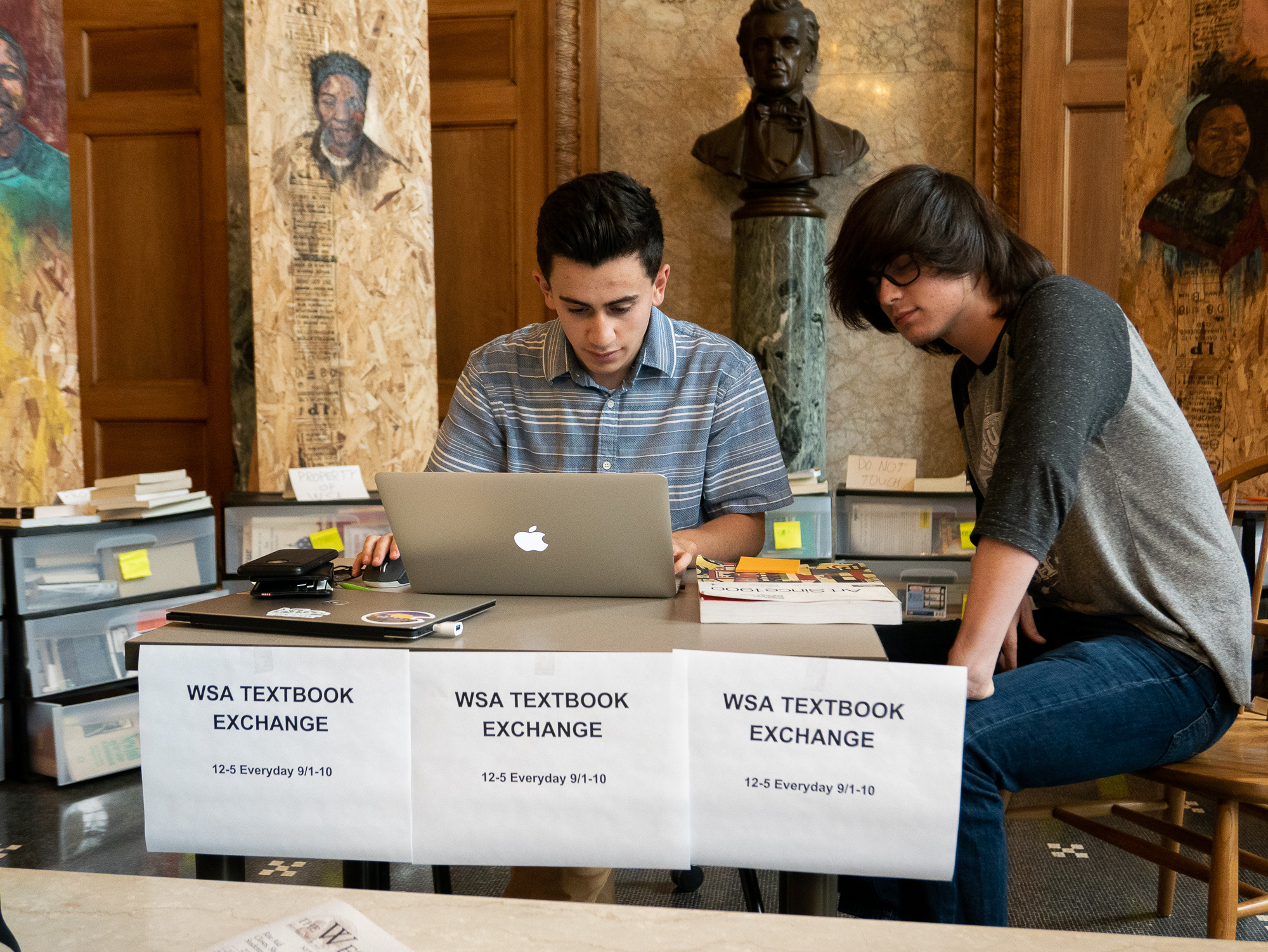
c/o Magda Kisielinska, Assistant Photo Editor
The Wesleyan Student Assembly (WSA) Textbook Exchange Program (TEP) began its second year on campus on Sept. 1, running until Sept. 10. The program facilitates textbook sales between students in the Olin Library Lobby and currently has over 600 books listed for sale. Since its soft launch during the Fall 2018 drop/add period, where the program ended its cycle with two books in its inventory, the TEP has grown faster than organizers anticipated, selling 196 books its first two days open this semester.
The directors of the program, WSA Academic Affairs Committee (AAC) Chair Jake Kwon ’21 and WSA senator Ben Garfield ’22 hope the TEP can provide students with a more accessible way to acquire affordable textbooks and make money back on books they have purchased, addressing one financial pressure of higher education.
“Obviously the dream with it remains that no one ever buys a new textbook again, but that’s never going to happen because there’s always new editions coming out and so on and so forth, but as much as we can get people buying books on the exchange is great,” Garfield said. “So just creating it as this program that everyone is using all the time, would be ideal.”
Students bring in textbooks that they wish to sell to the TEP and set their price. Smaller books can sell for as low as $1, while larger textbooks range from $20 to 40. Students can look at the spreadsheet of books currently available and their prices to determine what price they wish to set, and the TEP holds onto these books until another student wishes to purchase them. Once their book is purchased, the seller receives the money either through Venmo or cash and an email notifying them their book was sold. The TEP does not take a cut of the profits.
The TEP’s inventory expanded by around 500 books last semester’s finals period, Garfield explained, due in part to a large number of seniors who brought in books they accumulated over their Wesleyan careers. In this cycle, the TEP continued to expand, selling an unexpectedly large number of books, particularly textbooks for introductory classes.
“This textbook exchange program this semester really surprised me,” Kwon said. “It has been an idea that I have been supporting since my freshman year, and…now seeing the positive impact it has on campus, especially for incoming freshmen, really makes me feel happy that the WSA was able to bring this program to Wesleyan.”
With the significantly increased inventory, the TEP organizers continue to search for a more permanent location to store the textbooks. Currently, the textbooks are stored in boxes in Olin, but they hope to set up a dedicated space for students to retrieve the books they wish to purchase to decrease the labor TEP volunteers have to perform.
The WSA TEP uses the same model and same software as the Tufts Community Union (TCU) Textbook Exchange and is part of the Tufts-led Textbook Exchange Network (TEN) that also includes Brandeis and Ohio State University. The TCU Textbook Exchange saved its students $77,000 between the beginning of the 2018-2019 school year and early February, and Garfield hopes to calculate a similar statistic for Wesleyan students following the conclusion of this cycle of the TEP.
In the future, the directors plan to put together a volunteer program so students across campus can help run the exchange. In addition to the directors’ plans, Kwon emphasized the role that he hopes student feedback could play in the development of the TEP.
“For the future, I am so excited to see this program expand, but I also want to make sure we are keeping up with the feedback of the students and what they think of the program, and what they want out of the program,” Kwon wrote in an email to The Argus. “I hope that we continue to meet the student needs for cheap textbooks on campus to alleviate extreme costs, and I hope that we continue to stay diligent and efficient as the program becomes bigger.”
As the program continues to grow, Garfield hopes that the program will become students’ primary resource for textbooks.
“My overall goal with the next year or two with [the TEP] is to build it as this staple of how people buy their textbooks…that they wouldn’t even think about going to Amazon or R.J. Julia until they’d gone to the Textbook Exchange and see if they could get their book there,” Garfield said.
Jocelyn Maeyama can be reached at jmaeyama@wesleyan.edu.
Comments are closed